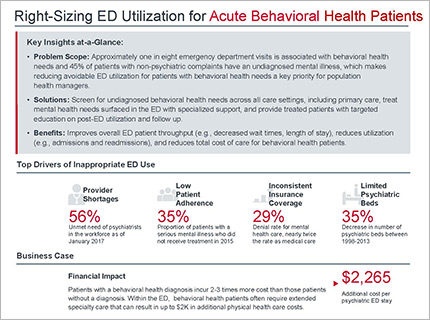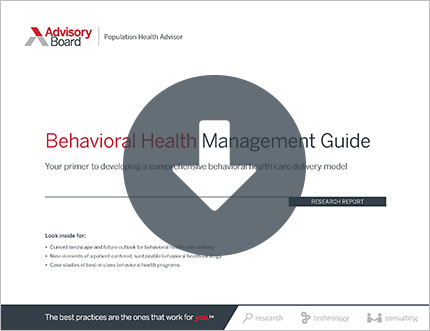Auto logout in seconds.
Continue LogoutEditor's note: This popular story from the Daily Briefing's archives was republished on March 14, 2019.
Patients with psychological disorders across the United States are participating in concentrated cognitive behavioral therapy (CBT)—a sort of "boot camp" in which patients see therapists for as much as 10 hours in a single day, Andrea Petersen reports for the New York Times.
March 19 webconference: 4 strategies to overcome the behavioral health access challenge
What is concentrated CBT?
Many researchers believe concentrated CBT's popularity in the United States stems from the work of Norwegian scientists led by Gerd Kvale and Bjarne Hansen. In their programs, patients with psychological disorders met in small groups, each working with their own therapists.
The treatment is centered around two eight- to 10-hour days of "exposure and response prevention," in which patients dive head first into situations that would trigger their anxiety, and do their best to avoid reducing that anxiety, Petersen writes. Therapists in the morning travel with patients to their homes and other places in their community that could trigger anxiety, and patients continue to expose themselves to such situations on their own in the afternoon.
Several studies have shown concentrated CBT is just as effective as traditional therapy. For example, a meta-analysis of randomized, controlled trials published last year in the journal Behaviour Research and Therapy found children in concentrated CBT programs were less likely to drop out of treatment than those in standard CBT. Overall, the study found children in concentrated CBT programs saw a 54% remission rate for anxiety disorders, compared with a remission rate of 57% among those in standard CBT—a difference that is not statistically significant, Petersen writes.
A separate meta-analysis published in the Journal of Obsessive-Compulsive and Related Disorders in 2015 looked at both randomized, controlled trials and trials without a control group. The research found patients with OCD who participated in concentrated CBT saw greater improvements after treatment than those who received weekly or twice-weekly CBT. After three months, both groups had improved equally.
US hospitals launch concentrated CBT programs
A number of institutions in the United States have launched concentrated CBT programs, Petersen writes. Weill Cornell Medicine in New York launched a program in 2016 aimed at helping teens with obsessive compulsive disorder (OCD), and the Child Mind Institute last year launched a two-day program for teens with social anxiety.
Emory University in Atlanta in 2015 launched a two-week concentrated CBT program focused on veterans with post-traumatic stress disorder (PTSD). There are similar programs for veterans at UCLA Health in California, Rush University Medical Center in Chicago, and Massachusetts General Hospital in Boston, Petersen reports.
Supporters of concentrated CBT—like Thomas Ollendick, a psychology professor at Virginia Tech—say while the programs might involve the same total number of hours as typical, once-a-week therapy programs, patients in concentrated CBT tend to improve faster. With concentrated CBT, "you don't have a week in between to unlearn what you learned in the session or have additional experiences that can lead you to think 'Oh, I better be afraid,'" Ollendick said.
It also can be easier for patients to attend two-week therapy sessions compared to once-a-week sessions, according to Barbara Rothbaum, a professor of psychiatry and behavioral sciences at Emory University School of Medicine. "People are pulled out of their everyday lives for two weeks—they are not dealing with work and spouses and kids," she said, adding, "It really is a kind of a bubble for them to do this work."
That isn't to say concentrated CBT is without its downsides, Petersen writes. The program can be costly, Petersen writes, noting the Houston spring break program costs $2,500 for the week. On top of that, many of the programs won't accept insurance, or if they do, many insurers cover only a small portion of the costs, while others require patients to first verify that less-intensive types of therapy were ineffective, according to Petersen (Petersen, New York Times, 8/13).
March 19 webconference: 4 strategies to overcome the behavioral health access challenge
To scale behavioral health access, health systems are launching new ways to deliver and organize behavioral health services. We'll highlight how provider organizations improve access and meet surging demand despite staffing shortages.
Join this webconference to learn how leading population health leaders are transforming their behavioral health service line.
Don't miss out on the latest Advisory Board insights
Create your free account to access 1 resource, including the latest research and webinars.
Want access without creating an account?
You have 1 free members-only resource remaining this month.
1 free members-only resources remaining
1 free members-only resources remaining
You've reached your limit of free insights
Become a member to access all of Advisory Board's resources, events, and experts
Never miss out on the latest innovative health care content tailored to you.
Benefits include:
You've reached your limit of free insights
Become a member to access all of Advisory Board's resources, events, and experts
Never miss out on the latest innovative health care content tailored to you.
Benefits include:
This content is available through your Curated Research partnership with Advisory Board. Click on ‘view this resource’ to read the full piece
Email ask@advisory.com to learn more
Click on ‘Become a Member’ to learn about the benefits of a Full-Access partnership with Advisory Board
Never miss out on the latest innovative health care content tailored to you.
Benefits Include:
This is for members only. Learn more.
Click on ‘Become a Member’ to learn about the benefits of a Full-Access partnership with Advisory Board
Never miss out on the latest innovative health care content tailored to you.


